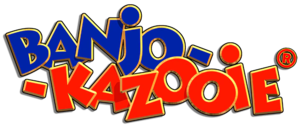Banjo-Kazooie (universe): Difference between revisions
No edit summary |
mNo edit summary |
||
| Line 37: | Line 37: | ||
===Music=== | ===Music=== | ||
====Original tracks==== | ====Original tracks==== | ||
*'''Spiral Mountain''': An arrangement of the Spiral Mountain theme, composed by Grant Kirkhope. | *'''Spiral Mountain''': An orchestral arrangement of the Spiral Mountain theme, composed by Grant Kirkhope. | ||
==Trivia== | ==Trivia== | ||
Revision as of 14:19, June 11, 2019
| Banjo-Kazooie (universe) | |
|---|---|
| Developer(s) | Rare |
| Publisher(s) | Nintendo THQ Microsoft |
| Genre(s) | Platformer |
| Console/platform of origin | Nintendo 64 |
| First installment | Banjo-Kazooie (1998) |
| Latest installment | Banjo-Tooie (XBLA) (2009) |
Banjo-Kazooie is a series of 3D platformers developed by Rare, Ltd. The games task the player with collecting various items in open worlds in order to progress.
Description
Following the massive success of Donkey Kong Country in 1994, a game famous for its pre-rendered CG graphics created on Silicon Graphics workstations, the game's developer Rare wanted to produce more titles utilizing the advanced graphics technology. Among the new games in production was Project Dream (also known as Dream: Land of Giants), a role-playing game which was to be Rare's masterpiece on the Super NES. The game starred a human boy named Edison and his dog Dinger, in a fantasy/pirate-themed adventure. Because the game was getting too large for a SNES cartridge, and the Nintendo 64 was on the horizon, the team decided to move the project to the Nintendo 64. In an attempt to appeal to a more mature audience, the game's fantasy themes were de-emphasized and its pirate themes strengthened. As development progressed, the team decided to replace Edison with a different protagonist, swapping in a rabbit, and eventually Banjo the bear, whom they gave a backpack to store his items. The development team soon realized their game was getting too ambitious, so they chose to retool it into a linear platformer. Soon, the concept of wings and legs sprouting out of the backpack emerged, thus birthing idea for a character living in the backpack , who is Kazooie the breegull . When the team saw an early build of Nintendo's Super Mario 64, they realized it would set the standard for 3D games and make their Dream look outdated, so they once again restarted the development, using Mario 64 as the basis for their new project, which eventually became Banjo-Kazooie. To help promote the upcoming title, Banjo was added as a playable character in Diddy Kong Racing.
Banjo-Kazooie was released in 1998 to strong sales and critical acclaim, with critics praising its detailed graphics, dynamic soundtrack, and arguable improvements over the foundation Mario 64 laid. A direct sequel, Banjo-Tooie, released in 2000. The Banjo intellectual property was fully transferred to Microsoft after they bought Rare in 2002. Rare developed two spin-offs for the Game Boy Advance, Banjo-Kazooie: Grunty's Revenge and Banjo-Pilot. After a long absence on consoles, a brand new game, Banjo-Kazooie: Nuts & Bolts, was released for the Xbox 360 in 2008. Though it received mostly positive reviews, it was highly controversial for its focus on building vehicles to traverse the game's worlds. This game was followed up by downloadable HD remasters of the two N64 titles. In 2015, all three console games were included in Rare Replay, a compilation of Rare games for the Xbox One.
In Super Smash Bros. Melee
Based on responses from fan questions confirming that Banjo would not be appearing in Super Smash Bros. Melee, a popular rumor of Banjo being cut from the game manifested, claiming that Banjo (along with James Bond from GoldenEye 007) was planned for inclusion but ultimately cut because Sakurai could not secure the rights from Rare. However, Sakurai only said that the characters would be difficult to include, not that he had planned to include them.
In Super Smash Bros. Ultimate
Banjo & Kazooie were confirmed in a Nintendo Direct at E3 to be represented as a DLC Fighter for Super Smash Bros. Ultimate alongside with the Hero from Dragon Quest.
Character
- Banjo & Kazooie: An easy-going bear and his sarcastic breegull sidekick, the duo debut as DLC Fighters. Banjo is armed with bear swipes, zips around the stage being carried by Kazooie, and summons the Jinjonator for the Final Smash.
Stage
- Spiral Mountain
Music
Original tracks
- Spiral Mountain: An orchestral arrangement of the Spiral Mountain theme, composed by Grant Kirkhope.
Trivia
- This is the first third-party universe, and the first character-based universe overall, to consist soley of playable characters that originated outside of Japan.
- It is also the first third-party universe to belong to a current console rival of Nintendo, in this case Microsoft; however, Rareware was once a second-party subsidiary of Nintendo, and Banjo debuted in the Donkey Kong franchise via technicalities.
- This is the second third-party universe with a playable female character, the first being Bayonetta.
|
| |
|---|---|
| Fighters | Banjo & Kazooie (SSBU) |
| Stage | Spiral Mountain |
| Other | Jinjo · The Mighty Jinjonator |
| Spirits | Spirits |
| Music | Ultimate |

